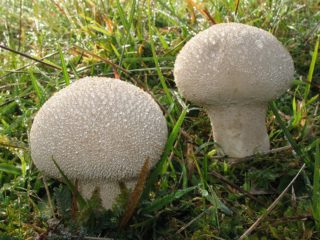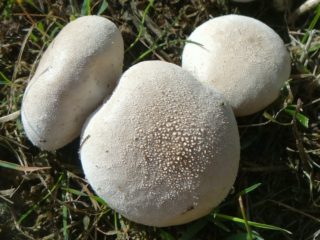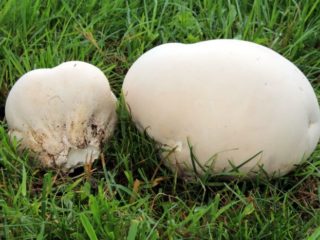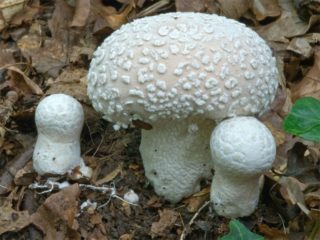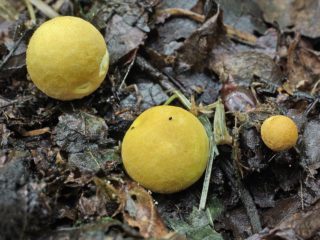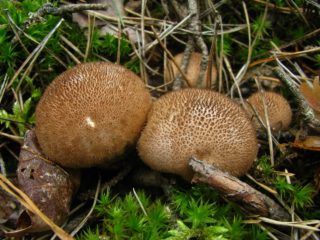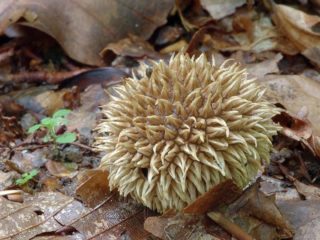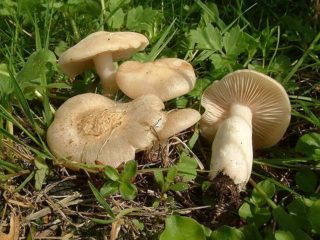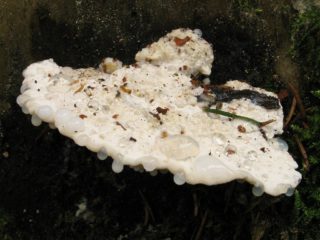Content
- 1 Description of pear shaped raincoat
- 2 Doubles and their differences
- 3 Where and how does the pear-shaped slicker grow
- 4 Is the pear-shaped slicker mushroom edible or not
- 5 How to cook pear shaped raincoats
- 6 The healing properties of pear-shaped raincoats
- 7 Is it possible to grow pear-shaped raincoats on the site
- 8 Conclusion
The pear-shaped raincoat is one of the most common representatives of the extensive genus of Raincoats belonging to the Champignon family. The pulp of a young mushroom, which has not yet had time to darken, is absolutely edible, but at an old age it is unsuitable for food. Often mushroom pickers undeservedly ignore pear-shaped raincoats, preferring to collect more "pedigree" gifts of the forest in the season. However, they are wrong: the young fruiting bodies of this mushroom can be fried and boiled, stewed, dried or frozen for the winter. Dishes from a young pear-shaped raincoat are delicious. In addition, this mushroom is known for a number of properties that are beneficial to human health. If you wish, you can try to purposefully grow a pear-shaped raincoat on your own garden plot.
Description of pear shaped raincoat
The fruiting body of a pear-shaped slicker is a white ball, narrowed downwards, in shape really resembles an inverted pear or a golf ball sitting on a short false leg. Often, the "pseudopod", tightly fused with the upper part, completely hides in the moss, which makes the mushroom seem absolutely round. The sizes of representatives of this type of raincoats are quite small: in height they usually reach 2-4 cm, and the diameter of their most voluminous part is from 3 to 7 cm.

A pear-shaped raincoat is easy to find in our forests after warm rains.
The color of the young mushroom is very light, almost white. With age, it darkens, gradually becoming dirty brown. As the pear-shaped raincoat grows, the structure of its surface also changes. In young organisms, it is granular, covered with outgrowths in the form of small, non-sharp thorns. In older fruiting bodies, the surface becomes smooth, but often a large mesh appears on it, hinting at cracking of the thick integumentary skin. If the mushroom is not young, it can be peeled off easily, like the shell of a boiled egg.
The pulp of young pear-shaped raincoats is colored white, less often creamy, and in consistency resembles dense cotton wool. It is quite edible, has a faint taste and a pleasant mushroom aroma. Over time, it becomes darker, acquiring a reddish-brown color, and turns into spores, changing its structure to loose, and then to powdery. In the upper part of the mushroom, which is fully ripe, a hole opens through which the spore powder pours out and scatters in the wind.Old pear-shaped raincoats are not suitable for human consumption.
Doubles and their differences
A pear-shaped raincoat is quite difficult to confuse with other types of raincoats. It is characterized by a well-defined "pseudopod", as well as the peculiarities of growth - usually it is present in large close "families" on decaying wood. This mushroom has no obvious counterparts.
However, you can find a certain similarity between pear-shaped and ragged raincoats. The latter is also an edible mushroom. Its entire surface is covered with white patches of flakes, reminiscent of cotton wool. Its fruiting body varies in color from light cream to reddish brown. This mushroom grows in small groups or singly. It is found exclusively in oak and hornbeam groves with a warm climate, while its pear-shaped "brother" can be easily found in any deciduous and mixed forests.
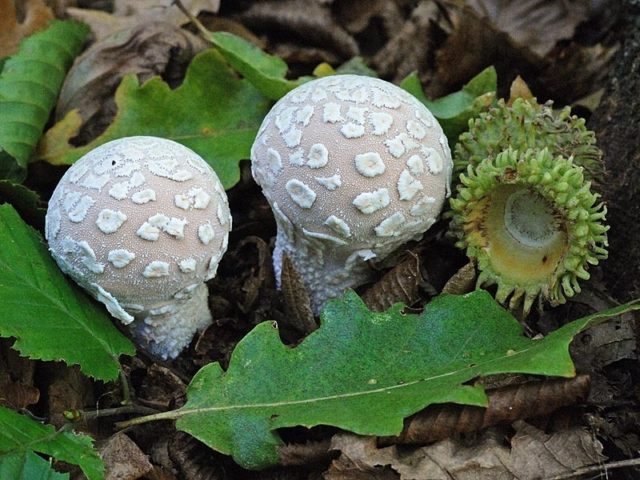
The ragged raincoat is distinguished by characteristic "flakes" on the integumentary skin
Another edible type of raincoat that is sometimes confused with a pear-shaped one is baggy bighead... It is distinguished by its relatively large size (the diameter of the thickened part is 10-15 cm), as well as its characteristic shape, slightly flattened at the top. The surface of this fungus is fine-grained, covered with well-defined cracks. Baggy golovach can be found in small groups or singly in meadows, glades, forest edges.
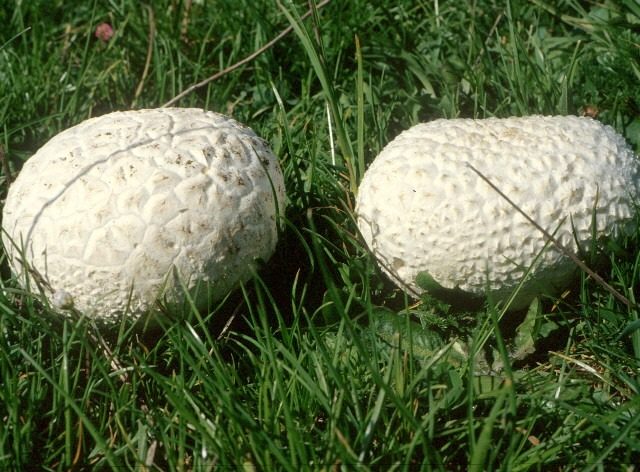
The head is baggy, larger in size and looks slightly "flattened" on top
In addition, you should be aware that in nature there are several types of pseudo-raincoats, united in the genus Scleroderma... These mushrooms are inedible, and although not directly classified as poisonous, if eaten in large quantities, they can cause poisoning or intestinal upset.
Distinguishing scleroderma from an edible raincoat is easy. These mushrooms usually grow in "nests" of several pieces. False-looking skin is usually thick, dense, covered with small scales or warty growths. It may also have small cracks. The skin color of scleroderma is usually yellowish or ocher, and the color of the pulp, even in a young fungus, is yellowish or olive. Sometimes it is possible to distinguish on it a "marble" pattern, which is formed by light streaks. As the fruiting body of the scleroderm matures, its central part darkens noticeably, first acquiring a gray-violet, then almost black tint. The pulp of mature pseudo-raincoats retains a dense structure. The smell of these mushrooms is usually sharp, unpleasant.
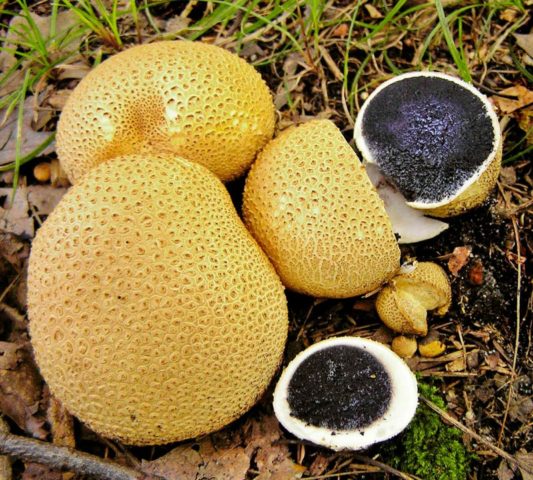
Scleroderma vulgaris refers to pseudo-raincoats
Where and how does the pear-shaped slicker grow
The pear-shaped raincoat is found almost everywhere in Russia from the beginning of July to the end of September. It can be found in deciduous or mixed forests, gardens and parks on decayed wood - mossy trunks of old trees, rotten stumps. Sometimes the remains of a tree can be buried in the ground on which these mushrooms are found. Usually pear-shaped slickers grow in large groups.
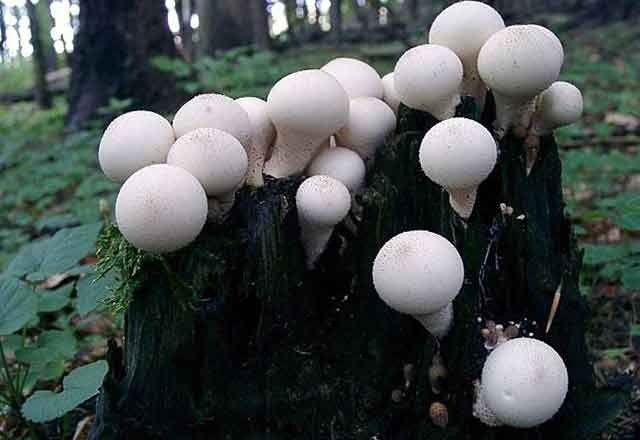
For growth and development, a pear-shaped slicker requires rotten wood.
Where in the forest you can find this mushroom and what it looks like, the video tells in detail:
Is the pear-shaped raincoat edible or not
Young specimens of a pear-shaped slicker with dense and white flesh are considered quite edible. The range of their use in cooking is wide: most often they are dried, but they are often fried, stewed and grilled, and also frozen for future use.These mushrooms perfectly tolerate heat treatment - they practically do not boil down, do not become too jelly-like or soft.
However, all of the above applies only to young raincoats. Once the flesh of the mushroom begins to darken as it matures, it will no longer be edible.
Their fruiting bodies are able to absorb harmful substances from air and water and accumulate them for a long time.
How to cook pear shaped raincoats
Raincoats, including pear-shaped ones, are actually not very popular with mushroom pickers. However, such an attitude towards them is unfair. A young pear-shaped raincoat will make wonderful tasty dishes if you prepare the mushrooms correctly and use proven recipes.
Cleaning and preparing mushrooms
Pre-treatment of a pear-shaped slicker is not difficult. It includes the following stages:
- Thorough rinsing of the mushrooms in clean water. Particular attention should be paid to the round "cap", which must be carefully cleaned of dirt and adhering debris, as well as coarse skin particles.
- Next, you need to clean the raincoats from the upper skin. It should be picked up with a convenient knife and carefully removed.
- After that, the mushrooms need to be cut. Small ones are divided in half, large ones - into more parts. If at the same time, places damaged by worms are found, they must be cut out.
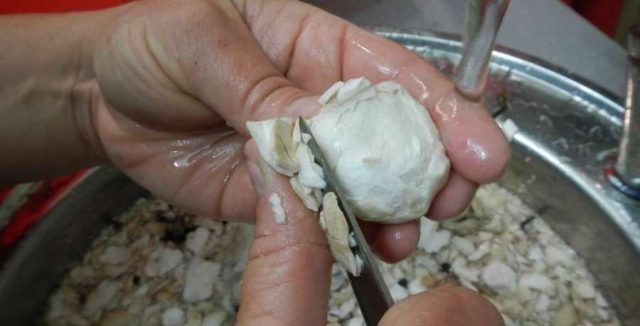
Pretreatment of pear shaped raincoat includes rinsing and cleaning
How to fry
Many people believe that pear-shaped raincoats are most delicious when fried. They make an excellent roast with mushroom flavor, which can be served with a variety of sauces and side dishes.
Pear-shaped raincoat | 0,4 kg |
Onion (large) | 1 PC. |
Garlic (cloves) | 2-3 pcs. |
Salt | taste |
Sunflower oil for frying |
|
Preparation:
- Rinse pear-shaped raincoats well under water and remove the tough integumentary skin. If necessary, cut into pieces of the desired size.
- Heat oil in a frying pan and add mushrooms. Fry, stirring occasionally, over high heat, until the contents are browned.
- In the process of frying, add the onion, cut into small pieces. Salt the dish.
- At the end of cooking, add crushed garlic and stir well.
- It is recommended to serve the dish hot, after sprinkling with herbs.

The taste of a fried pear-shaped slicker is incomparable
How to dry
Drying pear-shaped raincoats is the most popular way to prepare them. It is believed that in dried form, this mushroom is tastier than boiled. The raincoats prepared in this way can be ground into powder and then added to the base of sauces and first courses. In particular, the broth made from dried mushrooms of this type is very tender and aromatic.
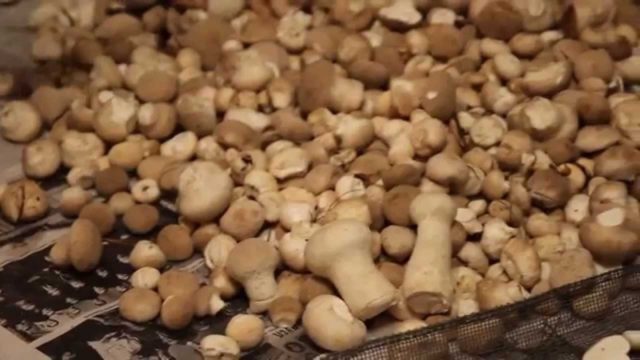
Dried raincoats make great first courses and sauces
To dry pear-shaped raincoats, they must be washed and cleaned, getting rid of the tough skin. If necessary, cut large specimens into several pieces. Then you should choose the most convenient drying method:
- Arrange the mushrooms on a wire rack and place in an oven preheated to 45 ° C, gradually increasing the temperature to 60 ° C. Keep the oven door ajar. The total cooking time is about 3 hours.
- String the mushrooms on strong threads or arrange in a single layer on wide baking trays lined with baking parchment and expose to fresh air in a place well-lit by the sun. At night, it is advisable to bring the baking sheets into a dry, ventilated room. In this case, the drying time will take several days.
- You can use an electric dryer. The raincoats should be cut into plates no more than 1 cm thick, put on a metal tray for drying, set the temperature to about 70 ° C and hold for 6-8 hours.
How to freeze
Freezing pear-shaped raincoats allows you to preserve their taste, shape, aroma, texture for a long time. The resulting semi-finished product is then used for the same dishes that can be prepared from fresh mushrooms.
In order to freeze pear-shaped raincoats, you must:
- rinse fresh mushrooms;
- select those with white flesh, and wipe gently with paper towels;
- cut them into thin slices, distribute in bags or containers for freezing and put in the freezer compartment of the refrigerator.
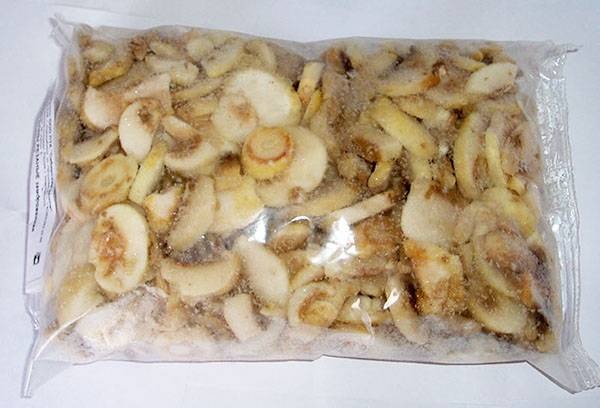
Frozen mushrooms are best stored in special bags
How to preserve pear-shaped raincoats for the winter
Another way to preserve pear-shaped raincoats for future use is canning in a marinade. These mushrooms make an excellent homemade preparation, which can be tasted after 4-5 days.
Pear-shaped raincoats | 2 l (already boiled mushrooms) |
Salt | 2 tbsp. l. |
Sugar | 1-1.5 tbsp. l. |
Dill seeds | 1 tsp |
Black pepper (peas) | 0.5-1 tsp |
Carnation | 2-3 pcs. |
Garlic (cloves) | 3 pcs. |
Vinegar (9%) | 4 tbsp. l. |
Preparation:
- To sort out the raincoats, it is advisable to cut each in half. Select young specimens with white flesh.
- Soak them in cool water for 20 minutes. Then rinse thoroughly and transfer to a saucepan, filling with clean water to the top.
- Put on fire, wait for a boil and boil for 15-20 minutes.
- Add spices and herbs. Keep on fire for another 10 minutes.
- Remove from stove. Pour in vinegar.
- Arrange in pre-prepared sterile half-liter jars. Add a little vegetable oil on top to each of them. Cover with sheets of parchment and tie with twine.
- After cooling down, place the workpiece in a cold place - a cellar or refrigerator.
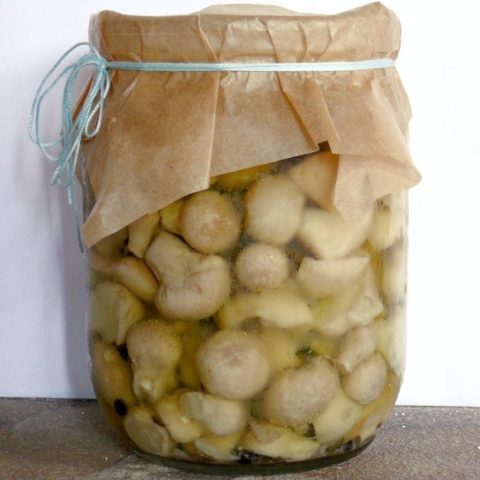
Marinaded raincoats are an excellent preparation for future use
Other recipes for making pear-shaped raincoats
There are other ways to cook pear-shaped raincoats deliciously without spending a lot of time and effort. For example, these mushrooms will turn out great if you first marinate them in homemade mayonnaise and then bake them in the oven under a brown cheese crust.
Pear-shaped raincoats | 1 kg |
Bow | 0.2KG |
Hard cheese | 0.3KG |
Mayonnaise (homemade) | 5 tbsp. l. |
Vegetable oil | 3 tbsp. l. |
Salt, pepper, dill | taste |
Preparation:
- Cut the cleaned and washed young pear-shaped raincoats into pieces and put in an enamel bowl.
- Add the onion, cut into halves.
- Mix mayonnaise with butter, salt and pepper.
- Pour the marinade over the mushrooms and onions and leave for about 1 hour.
- Meanwhile, grind the cheese (grate on a beetroot grater).
- Cover a baking sheet with foil and lightly grease with vegetable oil. Arrange the pickled mushrooms, cover with another sheet of foil and bake for half an hour.
- Unfold the foil, sprinkle the mushrooms with grated cheese and return to the oven for another 10 minutes.
- Sprinkle the finished dish with chopped herbs before serving.
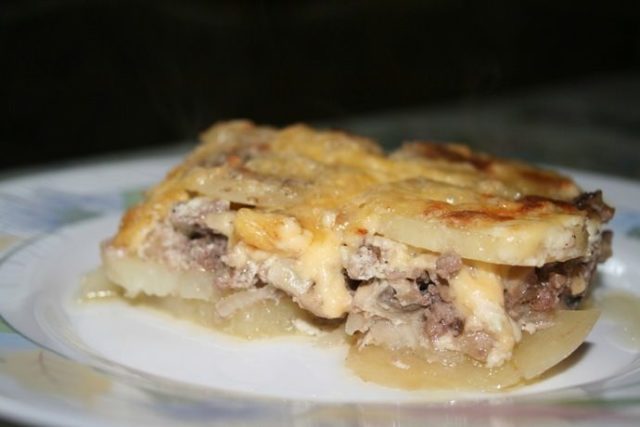
Pear-shaped raincoats, baked in the oven with cheese, can be prepared without difficulty
Pear-shaped raincoats stewed in sour cream along with boiled potatoes and onions will turn out to be very tasty, satisfying and fragrant.
Pear-shaped raincoats | 0.5KG |
Potatoes | 0.3KG |
Bow | 2 pcs. (medium) |
Low-fat sour cream | 0.2KG |
Salt pepper | Taste |
Vegetable oil for frying |
|
Preparation:
- Peel and boil potato tubers, pre-salt the water.
- Fry prepared (washed and peeled) pear-shaped raincoats in vegetable oil for about 25 minutes.
- Fry the onions separately until golden brown.
- Combine mushrooms and onions. Season with salt, pepper and fry for another 15 minutes.
- Add sour cream 5 minutes before tenderness and mix well.
- Cover the dish and simmer for 7-10 minutes, reducing heat to low.

Raincoats stewed in sour cream with potatoes and onions are a great option for a delicious and satisfying second course
The healing properties of pear-shaped raincoats
Preparations from the spores and fruiting bodies of the pear-shaped puffball are widely used in folk medicine as a means of treating a number of diseases. The composition of this mushroom is extremely rich in bioactive components, enzymes, amino acids, micro- and macroelements, which makes it possible to use it for medicinal and cosmetic purposes.
The benefits of a pear-shaped raincoat are as follows:
- its pulp has the ability to absorb and remove salts of heavy metals, radionuclides and toxic substances from the body;
- calvacin, which is part of this fungus, is known for its anti-cancer properties, suppressing the growth of malignant tumors;
- it is used as a natural antibiotic that reduces the activity of a number of pathogenic bacteria, in particular, tubercle bacillus;
- raincoats are used to treat frostbite and ulcers, cutting fresh mushrooms into thin slices and applying to the affected areas;
- the use of this mushroom in food helps to strengthen the human immune system, improve the functioning of the heart and blood vessels, helps with diseases of the stomach and intestines;
- powder from a dried slicker is used as a pain reliever, as well as a blood-stopping agent;
- preparations from his spores are used to treat diabetes, bronchial asthma, adrenal diseases, hypertension, pleurisy.
They help against diseases of a number of organs - in particular, the stomach, kidneys and liver. They are also used externally to get rid of skin diseases and disinfect wounds.
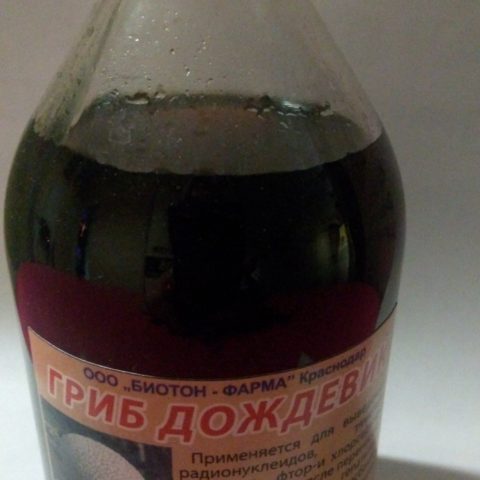
Alcohol tinctures on a pear-shaped raincoat are used in folk medicine as a remedy for many diseases
Is it possible to grow pear-shaped raincoats on the site
Little is known about growing a pear-shaped slicker at home, but there is such an opportunity. The basis for creating a garden bed with these mushrooms on your own site can be the mycelium of raincoats, purchased ready-made, or a self-made solution containing their spores.
To prepare such a solution, you will need to collect ripe raincoats. They should be finely chopped, filled with cold water and infused for several days, stirring from time to time.
Next, you need to prepare the garden bed. The area for growing a pear-shaped raincoat in the country should be in the shade of trees or be protected by an artificial canopy from direct sunlight. On it, you need to dig a trench about 2 m wide and at least 30 cm deep. It is recommended to fill it with a mixture of poplar, birch or aspen leaves, on top of which the branches of these trees should be laid. The layers should be tamped tightly so that their thickness is no more than 20 cm. They should be watered with water, and then the soil should be poured in a layer of about 5 cm. After that, the mycelium of raincoats is scattered over the entire area of the trench or a solution with spores is sprayed, the future garden bed is dripped and covered. its branches.
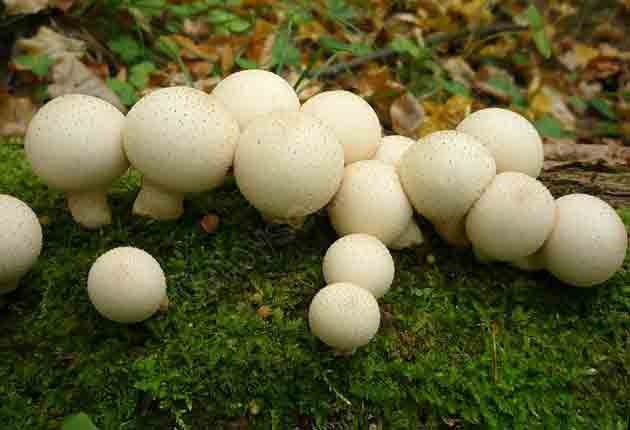
If you wish, you can try to grow raincoats on your own plot.
It is required to ensure that the land in the garden does not dry out, periodically watering it. Even a slight excess of moisture is allowed.
After the mycelium sprouts, it is advisable to carefully mulch the area with last year's leaves.
Conclusion
Pear-shaped raincoat is a mushroom that is very common in domestic forests and appears after warm rains. It is considered to be conditionally edible. Young specimens, the flesh of which is still white and firm, are quite edible. From them, you can cook a large number of delicious dishes and preparations for future use. Ripe mushrooms lose this property: their fruit body darkens and turns into spores, so they cannot be cooked.In addition, the pear-shaped raincoat has medicinal properties and has long been used in folk medicine. It is known that, with some effort, you can try to grow the plantation of such mushrooms artificially in your own garden.
